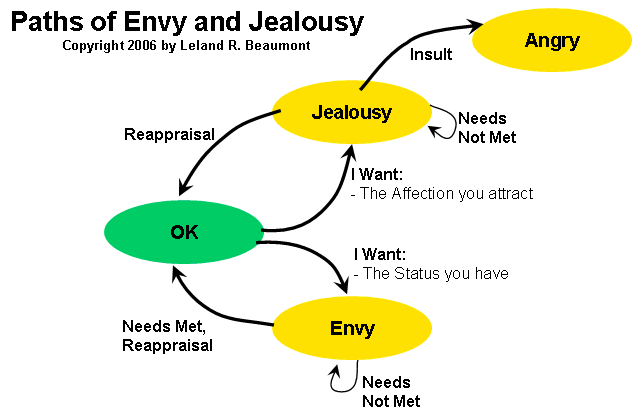Contents
The very thought that we envy someone is unpleasant to us. However, this feeling is completely natural and even useful if we control it.
For the first time, envy was divided into black and white by the ancient Greek philosopher Aristotle. In the first case, we are driven by the desire “I want you to lose what I like,” and this turns out to be destructive for us. In the second, the motivation changes — «I want to have what you have.» We enter into a competitive process that stimulates development.
Analyst Melanie Klein talks about how these feelings are set in infancy. With regard to the mother’s breast, the child experiences dual experiences: on the one hand, it is the personification of comfort and security, on the other hand, he is not able to own it completely and is forced to cry to remind him of his desires.
Thus, everything begins with an unconscious childish envy that not the child himself, but his mother, disposes of his body. In the future, much will depend on how our relationship develops in the parental family.
Envy is a latent and natural feeling in human nature.
“The more confident a child grows, who is loved and taught to rely on his own strength, the less pronounced envy will be in adulthood. Lack of attention to the child, on the contrary, provokes this feeling. For example, parents are the last to pick up a kid from kindergarten, and he begins to envy those children for whom they come on time.
At the same time, children’s envy can be expressed in aggression — the child begins to break the toys of the one whom, as it seems to him, mom and dad love more. However, excessive pampering can also lead to the development of envy. The child expects that all his whims are immediately fulfilled, and transfers this model to adulthood, where he passively expects rewards and begins to envy more successful people, ”says psychotherapist Tatyana Mizinova.
Who and why do we envy
We feel a burning feeling of envy only for someone who is close to our environment or social level. At the same time, we observe the life of stars with the same feeling with which we listened to fairy tales in childhood — for us, these are characters living in a mythical reality.
“The attitude towards people who are envious is usually negative, so the therapist’s question: “Are you jealous?” — usually a negative answer follows, — says Tatyana Mizinova. — And the person in most cases is not cunning. Sometimes he does not realize that this feeling is the cause of his constant emotional discomfort.
How to escape from the trap of envy
Envy is a latent and natural feeling in human nature. By recognizing this and ceasing to suffer from the fact that “only losers envy”, we thereby transfer emotions from a negative channel to a positive one.
Assess your options
Formulate what you envy and evaluate your ability to achieve this. “It is useful to visualize everything that you want to receive and have in your asset. To do this, in one column, write what makes you jealous. Then analyze under what circumstances you can achieve the same result. It may be necessary to get additional education, become more socially active, lose weight or change the style of clothing. All this is in your power. In the other column, make a step-by-step action plan. However, it is worth remembering that if in order to achieve what you want you have to break a lot in your own personality, then even a winning result will not make you happy, and you will again find yourself in a dead end, ”says Tatyana Mizinova.
Think about the downside of success
Try talking to the person you’re jealous about what’s behind their success. Did your friend become successful in her career? Remember how often lately you managed to meet her? Most likely, you will find out what she had to sacrifice due to constant employment. It is always important to ask yourself the question — do I really need this?










